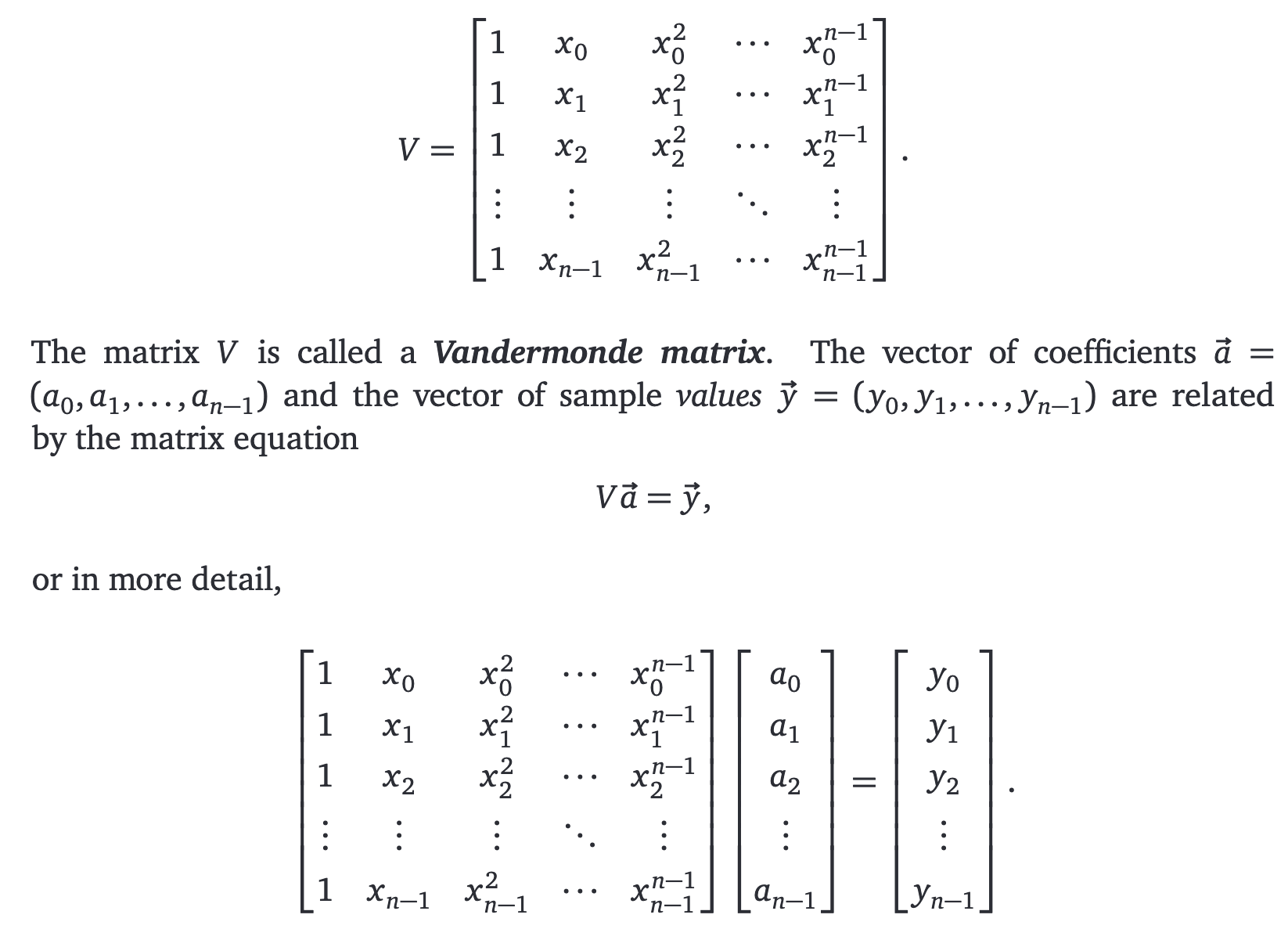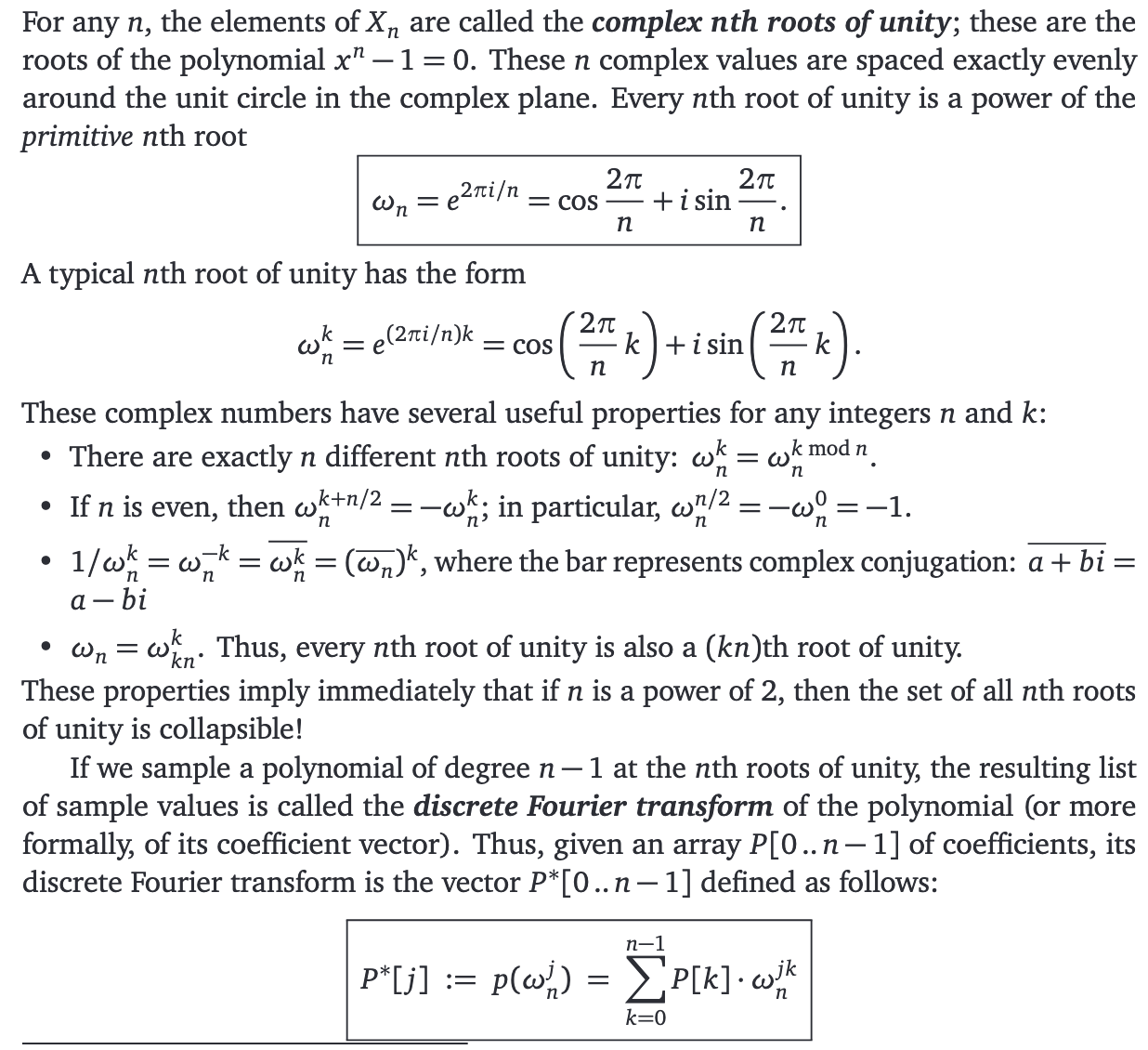I know this name for a long time. But never learnt it. Now it’s time.
Recap
Previously, Karatsuba’s algorithm for integer multiplication. It computes the result in $O(n^{\log_2 3})$ where $n$ is the number of digits.
Another recap: polynomial representation: $$ p(x) = \sum_{i = 0}^{n}p_ix^i $$ And we can represent this polynomial using an array of size $n$.
Evaluations and additions of polynomials are straightforward computation. Can be done in $O(n)$ time. Naive multiplication is slow, however. It takes $O(n^2)$ time to compute all the coefficient multiplications. FFT helps us speed up this multiplication.
Other representations of polynomials
Sample points!
$n$ degree polynomial takes $n+1$ points to identify. An easy, interesting, but super useful algorithm in crypto: Shamir Secret Sharing.
Multiplication
$O(n)$ time to multiply points element wise. However, since degree grows to $O(2n)$, we need $2n + 1$ samples for the result.
Addition
$O(n)$ time.
Evaluations (the catch)
$O(n^2)$ time. $$ p(x) = \sum_{j = 0}^{n-1} \left( \frac{y_j}{ \prod_{k \neq j} (x_j - x_k) } \prod_{k \neq j} (x - x_k) \right) $$
Roots
$$ p(x) = c(x-r_1) \cdots (x - r_n) $$
Multiplication
$O(n)$ time to multiply everything.
Addition
Complicated. Long time.
Evaluation
Simply plug in and compute in $O(n)$ integer multiplications.
Combination?
We want to combine advantages of the coefficient representation and the sampling representation. Suppose we are given the following polynomial:
$$ p(x) = \sum_{i = 0}^{n - 1}a_i x^i $$ And sample points: $(x_0, \ldots, x_{n-1}),(y_0, \ldots, y_{n-1})$.
We can convert from coefficients to samples by using Vandermonde matrix:

This is like evaluating the polynomial $n$ times. It takes $O(n^2)$ time. However, can we choose the sample points carefully so that we can make this faster?
Recall: divide and conqure in integer multiplications
` $$ \begin{align*} x \gets a \cdot 10 ^{n/2} + b\ y \gets c \cdot 10 ^{n/2} + d\
\end{align*} $$ `
huh? They look like polynomials.
In polynomials?
$$ \begin{align*} \underbrace{p(x)}_{\text{degree }n} &= a_0 + a_1 x + \ldots + a_{n-1}x^{n-1}\\ &= x \cdot \underbrace{p_{\text{odd}}}_{\text{degree }n / 2} + \underbrace{p_{\text{even}}}_{\text{degree }n / 2} \end{align*} $$

“The size of a collapsing set must be a power of 2.”
If $T(n)$ = evaluating a degree $n-1$ polynomial on a collapisble set of $n$ sample points, $$ T(n) = 2T\left(\frac{n}{2}\right) + O(n) $$
Constructing a huge collapsible set
$$ \set{1} \to \set{1, -1} \to \set{i, -i, 1, -1} \to \cdots $$
Reapeating $k$ times gives us a collapsible set of size $2^k$. This is called $2^k$ complex roots of unity.

We want to go back from samples to coeff:
Previously we had $\vec{y} = V \cdot \vec{a}$. To get back, we multiply the inverse of $V$ on both sides. This multiplication can also be solved using DFT (only minor changes).
Now, polynomial multiplication
High-level: for the input we have two polynomials $P, Q$. We run FFT to get $P^*, Q^*$, which are in sample form. We do multiplication on these two samples in $O(n)$ time, getting $R^*$. Finally, we compute inverse FFT and return.
Other use cases
- Convolution of sequences. Almost exactly the same as polynomials. But we only want the coefficients.
Reference:
https://courses.grainger.illinois.edu/cs473/fa2024/notes/A-fft.pdf